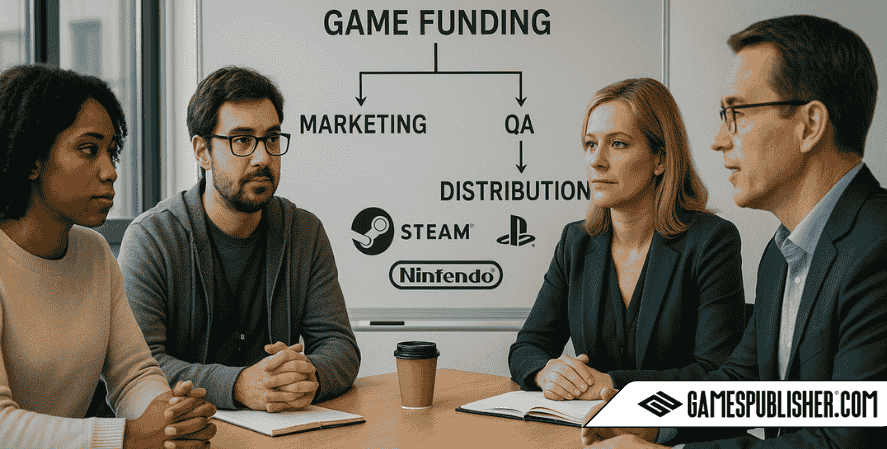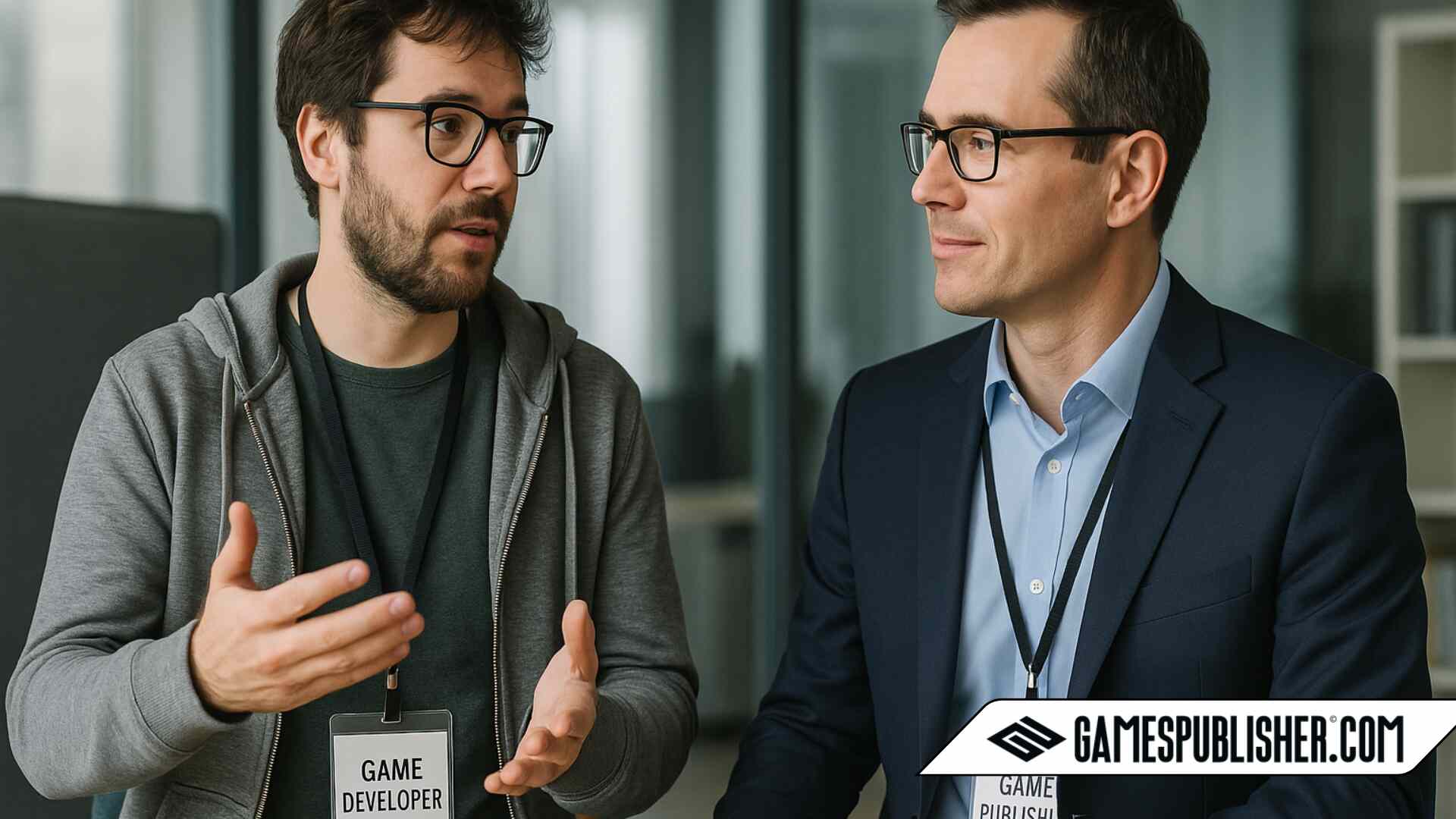Understanding a game publishing contract is essential for any developer navigating the competitive world of game development. Whether you’re an indie creator or part of a studio, knowing how long these contracts last can impact your game’s future—including revenue, intellectual property rights, and long-term flexibility.
So, how long do publishing contracts usually last? Are there standard durations, or do they vary depending on the type of game or publisher? In this guide from Gamespublisher.com, we’ll explain the different types of contract durations, what developers should watch for, and how to approach negotiation.
What Is a Game Publishing Contract?

Before diving into timelines, let’s define what a game publishing contract is and what it covers.
Definition and Purpose
A game publishing contract is a legal agreement between a developer and a publisher. It outlines how a game will be funded, developed, marketed, and released. It also defines financial terms, intellectual property rights, and expectations for both parties.
These agreements help ensure the game reaches players through marketing, digital storefronts, and even physical distribution.
Who’s Involved?
- Developer: Designs, builds, and produces the game.
- Publisher: Provides funding, marketing, QA, and distribution.
- Platform Holders: May be involved when publishing to platforms like Steam, PlayStation, or Nintendo.
What the Contract Includes
Typical terms cover:
- Development milestones and deadlines
- Revenue share and funding models
- Launch timing
- Marketing efforts
- Rights over game content and intellectual property
- Post-launch patches, updates, and support
Common Game Publishing Contract Durations

Contract length can vary based on game size, scope, and publisher preferences. Let’s look at the different ways contracts are structured.
Fixed-Term Contracts
These are the most common and last a set period, often between 2 to 5 years. A shorter contract might suit a single-player game with limited post-launch activity. Longer contracts are typical for games with live-service models or frequent updates.
For example:
- A 3-year contract might include 1 year for development and 2 years for monetization.
- A 5-year agreement might support multiplayer updates and expansion packs.
Milestone-Based Contracts
In milestone-based deals, the contract lasts until the developer reaches specific goals:
- A playable vertical slice
- Alpha or beta releases
- Final launch
- Post-launch content delivery
These contracts provide more flexibility and can help protect the publisher’s investment while giving developers control over the timeline.
Revenue Recoupment Contracts
Some publishers keep rights to the game until their investment is repaid, plus a margin. These contracts can last beyond five years, especially for games with slow or long-tail sales. This model is more common with high-budget titles or AAA games.
How Publisher Type Affects Contract Length

The type of publisher you’re working with can strongly influence the contract duration.
Indie Publishers
Indie publishers often offer short, flexible contracts. These arrangements help get the game to market without long-term control over the IP.
- Duration: 1 to 3 years
- Focus: Fast publishing, light marketing, creative freedom
- Examples: Devolver Digital, Raw Fury, Annapurna Interactive
Mid-Size and AAA Publishers
Larger publishers offer longer-term deals due to their global scale and higher investments.
- Duration: 3 to 7 years or more
- Focus: Global release, long-term support, monetization
- Examples: Ubisoft, Electronic Arts, Sony, Microsoft
These contracts may include performance-based funding, localization, console ports, and technical support.
Platform or Console Publishers
When a developer signs a contract directly with a platform holder like Sony or Nintendo, the deal may include exclusivity terms and unique technical requirements.
- Duration: Varies widely
- Includes: Platform certification, SDK access, storefront rules
For example, publishing a game on Steam may not require exclusivity, but a deal with Nintendo Switch might include timed exclusivity for one year or more.
IP Ownership and Contract Duration
A publishing contract often affects who controls the rights to the game and for how long.
Temporary Licensing
In most cases, developers keep the intellectual property (IP) rights while the publisher gets a license to market and distribute the game for a set time.
This is common with indie publishers or small studios seeking to maintain creative control.
Permanent IP Transfer
Some publishers require full IP ownership in exchange for full development funding. This is more common with AAA games or when the publisher takes on significant financial risk.
Reversion Clauses and Sunset Terms
Look for contracts with clauses that return rights to the developer when:
- The contract expires
- Sales drop below a set amount
- The publisher stops supporting the game
These terms protect developers and allow for future remasters or sequels.
What Affects Game Publishing Contract Length?

Each game is different, and many factors determine how long a publishing contract should last.
Game Scope and Budget
Smaller games with limited content need shorter support periods. Bigger games, especially those with multiplayer or online features, may require years of updates, making longer contracts necessary.
Distribution and Marketing Support
If your publisher manages a global release, handles print distribution, or launches physical collector’s editions, they’ll want more time to maximize returns.
Post-Launch Content Plans
Games with roadmaps, seasonal content, or paid DLCs benefit from extended partnerships. Live-service titles like battle royale games or RPGs require ongoing attention, which leads to longer publishing agreements.
Revenue Sharing Models
Payment structure can impact how long the deal needs to last:
- Flat fee: The contract ends after the release or a defined window.
- Revenue share: The publisher may retain rights longer to recover their investment.
Case Studies: Real Examples of Contract Durations
Looking at how different publishers handle contract lengths can help developers understand industry norms.
Devolver Digital
This indie-friendly publisher often signs 1–2 year contracts, offering flexibility and creative freedom. Developers maintain ownership and have freedom to self-publish future games.
Annapurna Interactive
Known for working with story-driven and artistic indie titles. Their contracts usually last 2–3 years and aim to support long-term visibility without locking developers into long exclusivity.
Epic Games Publishing
Epic offers contracts that tie duration to revenue recovery and service delivery. Developers may benefit from extended support and favorable revenue splits, especially for Unreal Engine titles.
How to Negotiate Game Publishing Contract Length

Game developers don’t always have equal bargaining power—but every contract is negotiable. Here are tips to help secure the best terms:
Ask for Extension Clauses
Include terms that allow contract renewal if your game performs well. This provides flexibility without locking you into a long agreement from the start.
Involve Legal Help
Always have a legal expert with game contract experience review the terms. This ensures the deal is fair and protects your IP.
Tie Duration to Performance
Negotiate for contracts that adjust based on milestones, sales, or player engagement. If you’re meeting expectations, that should strengthen your position during renegotiation.
Consider Ownership Rights
Even if you give temporary rights to the publisher, try to retain IP ownership or set conditions for rights to return to you after the contract ends.
What Happens When the Contract Ends?
When a game publishing contract expires, several outcomes are possible. Developers need to plan for this phase.
Rights Reversion
Make sure your contract states clearly when you regain rights. Without this, you might not be allowed to port or update your own game.
Ongoing Royalties
Some contracts allow continued sales by the publisher after the term ends, with a share of profits still going to the developer.
Preparing for Self-Publishing
Ending a contract doesn’t mean the end of your game. Many developers go on to self-publish re-releases or sequels using the community and revenue base built during the publishing term.
Bonus Section: Digital Storefront Contracts
Some developers publish directly to storefronts like Steam, Epic Games Store, or GOG. While not traditional publishing contracts, these agreements still involve terms and durations.
Steam Direct
Steam’s self-publishing platform requires a one-time fee and submission process. While there is no set contract duration, developers must agree to Steam’s terms, which include revenue sharing and refund policies.
Epic Games Store
Epic sometimes offers funding or timed exclusivity in exchange for a period of exclusivity. These terms often last 6 to 12 months and involve upfront payments.
Frequently Asked Questions (FAQs)
It can range from 1 to 7 years, depending on the scope, publisher type, and revenue structure.
Not necessarily. Some contracts offer temporary licensing, while others may demand permanent transfer. Always check for reversion clauses.
Yes if the contract allows it. Some deals include post-contract royalties or rights reversion.
Game publishers provide funding, marketing, QA, localization, and distribution letting game developers focus on development.
You can self-publish via Steam Direct, or work with a video game publisher who handles distribution for you.
Conclusion
The duration of a game publishing contract is more than a number—it shapes your creative control, revenue, and post-launch freedom. From indie deals to AAA publishing agreements, contract terms vary widely depending on your goals, game type, and the publisher involved.
Always align the duration with your development timeline, post-launch content plans, and business strategy. And never sign a contract without fully understanding what it means for your IP and your future.
Final Tip
Always consult with legal and financial professionals before signing any game publishing contract. Clear terms today can protect your game and your studio for years to come.
Call to Action
Are you navigating your first game publishing contract or renegotiating an existing one? Don’t do it alone. Connect with industry experts, publishers, and legal professionals to make sure your contract length and terms work in your favor.
Stay informed, stay protected and keep creating great games.
Loading survey...

